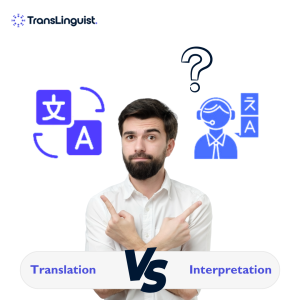E-Learning plays an important role in translation and interpretation services. The utilization of e-learning as a pedagogical instrument for digitized content seems to be of particular relevance in the instruction of linguists because the techniques required are important for any competent translation activity. E-learning also enables for parallel setups and the expansion of educational sectors.
Learning multiple languages in order to become a competent translator or interpreter is a difficult task. It requires high-quality foreign linguistic skills in a variety of fields. All of these elements, including the ability to quickly identify from a wide range of linguistic frameworks, appropriately and concisely convey particular terms, contextual indicators, complicated or symbolic significance ideas, and continuously expand language skills for communicating ideas, are dependent on expertise and requiring constant improvement.
Qualified interpretation operations provided through e-learning will minimize effort, handle cultural variations, lower costs, increase performance, and thus increase overall productivity. Translation and adaptation of training material for a certain cultural background will be enhanced by eLearning localization. Businesses can educate staff members to understand the languages expertise more efficiently by using an e-learning platform for interpretation. It’s considerably easier to translate a Language classes into that local dialect than it is to deploy someone to provide the instruction to workers with a real translator.
E-learning has a significant impact on cultural relevance. eLearning localization is important whenever a business’s target group is international. Although localization helps firms avoid sights, movements, and expressions that could be misleading or insulting, these interpretations will be culturally responsive and appropriate as well. ELearning Localization improves the learnability indices, which boosts the learner’s performance and the business’s return on investment.
Through ethnically tailored demonstrations for every group, it assists to increase the development cycles and engagement. It eliminates the requirement for pre-processing and simplifies the incorporation of international Learning management systems. The content discovery approach aids in the identification of culturally sensitive content and the identification of potentially conflicting images, colors, idioms, and other elements. This is critical for any firm that wants to achieve high levels of success.




